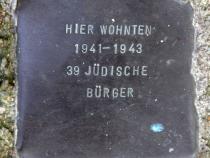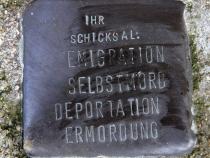Location
Solinger Straße 10
District
Moabit
Stone was laid
September 2003
Born
01 December 1879 in Rawitsch (Posen) / Rawicz
Survived
Elisabeth Grünbaum was born Elisabeth Brann on 1 December 1879 in Rawitsch (Polish: Rawicz) in what was then the Prussian province of Posen. She was the seventh of eight children born to Jewish husband-and-wife Hermann Elias and Ernestine (née Marcus) Brann.
On 19 July 1904, aged 24, Elisabeth married Georg Grünbaum, a salesman, in Posen. The following year, on 24 October, their daughter Liselotte was born. Their son Herbert was born almost twelve years later, on 27 August 1917. Elisabeth Grünbaum lived in Posen until October 1920, when she and her family moved to Berlin. Here, her husband Georg became part-owner of a wholesale company dealing in textiles, haberdashery and toys, Wilhelm Reschke, based at Neue Friedrich Straße 71 (now part of Roch Straße) in Mitte.
Not long after the Nazis came to power, the business partners were hit by anti-Semitic terror, as Elisabeth Grünbaum later described in her application for compensation: “In spring 1933 SA men came to get all the co-partners of our company W. Reschke, took them to a cellar, stripped them and beat them terribly with rubber truncheons. My husband was not among them as he happened to be out of town at the time. The SA men had threatened to come back, so I was in constant fear that my husband would return early from his trip and be attacked as well. Luckily, I was able to warn him in time and he was spared – but I will never forget the tension and fear in those weeks.”
In 1934 Elisabeth Grünbaum’s daughter Liselotte emigrated with her husband, a medical doctor named Dr. Erich Koplowitz, to Spain. Her son Herbert also went into exile, emigrating in 1936 to Switzerland. In early May 1936 Elisabeth and her husband moved from Solinger Straße 10 in Moabit to an apartment at Gustloff Straße 51 (now Dernburg Straße) in Charlottenburg. Here they witnessed the November pogroms in 1938, as Elisabeth Grünbaum later recalled with horror:
“One of the worst episodes was the ‘Night of Broken Glass’ and the weeks that followed. Every time the doorbell rang, my husband hid in a WC on a landing between the floors on the back stairs while I, after a brief wait, fearfully opened the front door, always thinking: Have they come to get him now? – In that period our business was also ‘Aryanised’ and we were robbed of our means of existence. I then spent hours in consulate waiting rooms, trying to get entry visas for myself and my husband to another country.”
In early 1941 her efforts paid off at last and she and her husband were authorized – after paying a so-called “emigré fee” and “Reich flight tax” totaling almost 4,000 Reichmarks – to join their daughter in Spain. “When we finally received the visa for Spain in January 1941 after immense difficulties, my husband was already severely ill. The journey across occupied France in a sealed railway carriage was agonizing, especially as we were in constant fear of the SS or Gestapo getting us off the train at the last minute, as happened to so many Jews. The time in Spain was also very hard. Even though our personal safety was no longer directly under threat, our lack of means and my husband’s illness caused us a great deal of concern. My husband still suffered severely from what had happened in Germany and could not get over the injustice done to him. Because of his chronic anxiety, especially at night, it was exhausting to look after him, and this impacted severely on my frame of mind. As a result, I suffered depression, severe gastritis and a complete breakdown when my husband died in January 1946. Another heavy blow came when I received news of the deportation of many relatives and friends, including my eldest sister and two of my husband’s siblings.”
In 1950, four-and-a-half years after the death of her husband, Elisabeth Grünbaum went to live with her son in Switzerland. She continued to suffer from anxiety and depression as a result of persecution. She died aged 88 on 26 March 1968 in Hilterfingen in the canton of Berne.
On 19 July 1904, aged 24, Elisabeth married Georg Grünbaum, a salesman, in Posen. The following year, on 24 October, their daughter Liselotte was born. Their son Herbert was born almost twelve years later, on 27 August 1917. Elisabeth Grünbaum lived in Posen until October 1920, when she and her family moved to Berlin. Here, her husband Georg became part-owner of a wholesale company dealing in textiles, haberdashery and toys, Wilhelm Reschke, based at Neue Friedrich Straße 71 (now part of Roch Straße) in Mitte.
Not long after the Nazis came to power, the business partners were hit by anti-Semitic terror, as Elisabeth Grünbaum later described in her application for compensation: “In spring 1933 SA men came to get all the co-partners of our company W. Reschke, took them to a cellar, stripped them and beat them terribly with rubber truncheons. My husband was not among them as he happened to be out of town at the time. The SA men had threatened to come back, so I was in constant fear that my husband would return early from his trip and be attacked as well. Luckily, I was able to warn him in time and he was spared – but I will never forget the tension and fear in those weeks.”
In 1934 Elisabeth Grünbaum’s daughter Liselotte emigrated with her husband, a medical doctor named Dr. Erich Koplowitz, to Spain. Her son Herbert also went into exile, emigrating in 1936 to Switzerland. In early May 1936 Elisabeth and her husband moved from Solinger Straße 10 in Moabit to an apartment at Gustloff Straße 51 (now Dernburg Straße) in Charlottenburg. Here they witnessed the November pogroms in 1938, as Elisabeth Grünbaum later recalled with horror:
“One of the worst episodes was the ‘Night of Broken Glass’ and the weeks that followed. Every time the doorbell rang, my husband hid in a WC on a landing between the floors on the back stairs while I, after a brief wait, fearfully opened the front door, always thinking: Have they come to get him now? – In that period our business was also ‘Aryanised’ and we were robbed of our means of existence. I then spent hours in consulate waiting rooms, trying to get entry visas for myself and my husband to another country.”
In early 1941 her efforts paid off at last and she and her husband were authorized – after paying a so-called “emigré fee” and “Reich flight tax” totaling almost 4,000 Reichmarks – to join their daughter in Spain. “When we finally received the visa for Spain in January 1941 after immense difficulties, my husband was already severely ill. The journey across occupied France in a sealed railway carriage was agonizing, especially as we were in constant fear of the SS or Gestapo getting us off the train at the last minute, as happened to so many Jews. The time in Spain was also very hard. Even though our personal safety was no longer directly under threat, our lack of means and my husband’s illness caused us a great deal of concern. My husband still suffered severely from what had happened in Germany and could not get over the injustice done to him. Because of his chronic anxiety, especially at night, it was exhausting to look after him, and this impacted severely on my frame of mind. As a result, I suffered depression, severe gastritis and a complete breakdown when my husband died in January 1946. Another heavy blow came when I received news of the deportation of many relatives and friends, including my eldest sister and two of my husband’s siblings.”
In 1950, four-and-a-half years after the death of her husband, Elisabeth Grünbaum went to live with her son in Switzerland. She continued to suffer from anxiety and depression as a result of persecution. She died aged 88 on 26 March 1968 in Hilterfingen in the canton of Berne.




